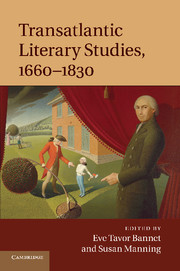Book contents
- Frontmatter
- Contents
- Notes on contributors
- Acknowledgements
- Introduction: British and American genres
- Chapter 1 Transatlantic books and literary culture
- Chapter 2 Transatlantic utopianism and the writing of America
- Chapter 3 Tales of wonder, spiritual autobiographies, and providence tales
- Chapter 4 Life writings
- Chapter 5 Benjamin Franklin and transatlantic literary journalism
- Chapter 6 Theatre, drama, performance
- Chapter 7 Transatlantic American Indians
- Chapter 8 Literature of the ocean
- Chapter 9 “To gird this watery globe”
- Chapter 10 Ghostly and vernacular presences in the black Atlantic
- Chapter 11 Susanna Rowson and the transatlantic captivity narrative
- Chapter 12 Domestic fiction and the reprint trade
- Chapter 13 Transatlantic Gothic
- Chapter 14 Transatlantic Romanticisms
- Chapter 15 Journeys of the imagination in Wheatley and Coleridge
- Chapter 16 Transatlantic historical fiction
- Further reading
- Index
- References
Chapter 10 - Ghostly and vernacular presences in the black Atlantic
Published online by Cambridge University Press: 05 January 2012
- Frontmatter
- Contents
- Notes on contributors
- Acknowledgements
- Introduction: British and American genres
- Chapter 1 Transatlantic books and literary culture
- Chapter 2 Transatlantic utopianism and the writing of America
- Chapter 3 Tales of wonder, spiritual autobiographies, and providence tales
- Chapter 4 Life writings
- Chapter 5 Benjamin Franklin and transatlantic literary journalism
- Chapter 6 Theatre, drama, performance
- Chapter 7 Transatlantic American Indians
- Chapter 8 Literature of the ocean
- Chapter 9 “To gird this watery globe”
- Chapter 10 Ghostly and vernacular presences in the black Atlantic
- Chapter 11 Susanna Rowson and the transatlantic captivity narrative
- Chapter 12 Domestic fiction and the reprint trade
- Chapter 13 Transatlantic Gothic
- Chapter 14 Transatlantic Romanticisms
- Chapter 15 Journeys of the imagination in Wheatley and Coleridge
- Chapter 16 Transatlantic historical fiction
- Further reading
- Index
- References
Summary
What kind of case is a case of a ghost? It is a case of haunting, a story about what happens when we admit the ghost – that special instance of the merging of the visible and the invisible, the dead and the living, the past and the present – into the making of worldly relations and into the making of our accounts of the world. It is a case of the difference it makes to start with the marginal, with what we normally exclude or banish, or, more commonly, with what we never even notice.
Avery Gordon, Ghostly Matters: Haunting and the Sociological Imagination (Minneapolis: University of Minnesota Press, 1997), pp. 24–25In seeking to write a comprehensive account of the literature of the black Atlantic and abolition, the critic is hamstrung by silence and absence as large majorities of Africans in the diaspora were non-literate and often uncounted and unaccounted for. These absent figures are of course paralleled throughout our period by the majority of white women and the transatlantic working class who had little access to the tools of literacy. Here, though, I want to concentrate on African-Atlantic figures whose cultural marginality was arguably the most extreme of these three groups. Critics such as the late Paul Edwards, Houston Baker Jr., Henry Louis Gates Jr., Vincent Carretta, Moira Ferguson, Sara Salih, Brycchan Carey, Peter Kitson, Srivinas Aravamudan, Peter Fryer, Norma Myers, Gretchen Gerzina, David Dabydeen, and Helen Thomas have constructed coherent studies that have brought to life or provided contexts to the lives of such important literary figures as Olaudah Equiano, Phillis Wheatley, Ignatius Sancho, Jupiter Hammon, John Marrant, Ukawsaw Gronniosaw, Ottobah Cugoano, Venture Smith, Robert Wedderburn, and Mary Prince. I shall return to some of these writers later in this chapter.
But, to start from the midst of the literary academy where so much important work has been done, however tempting, would not speak to the realities of our period where writing by blacks was a marginal occupation and did not reflect the experience of most black Atlantic people. Black hands were mostly not writing hands, they were for labor. I want to begin with a black female hand that is a remnant from the eighteenth century because it reveals the way black presences shadow Anglo-American culture. This mummified black hand, dried with the bones neatly cut, was kept in a prized position above the fireplace in a white British family as late as the 1940s, a plaything for the lonely daughter of the house. The hand had almost certainly belonged to Frances Elizabeth Johnson (Fanny) born in St. Kitts in the West Indies in 1751 and brought to Lancaster by her owner John Satterthwaite in 1778. He had just married Mary Rawlins and this marriage had combined two significant Lancaster families who made their money in the slave and West Indian trades as many other families did in the period when the city was the fourth largest slave port in Britain. Fanny's mummified hand, buried in 1997 during a special ceremony at the Priory church where she was baptized, can stand as a material spectre to remember other black lives that made little or no mark on the written record and whose presence we need to save from the obliquity of sentimentalist appropriations.
- Type
- Chapter
- Information
- Transatlantic Literary Studies, 1660–1830 , pp. 154 - 168Publisher: Cambridge University PressPrint publication year: 2011



